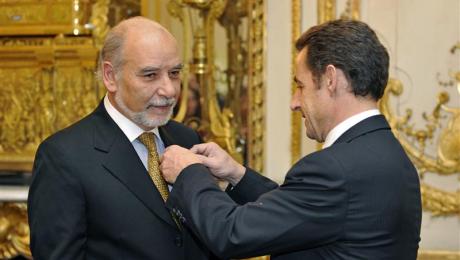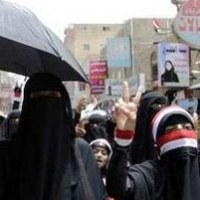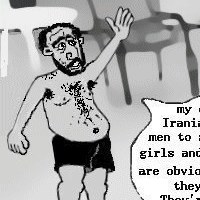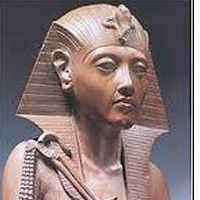![]()
Tue, Aug 23, 2011 | Rubin Reports | By Barry Rubin

President Nicolas Sarkozy presents the Legion of Honour to the Moroccan writer Tahar Ben Jelloun, February 1, 2008. (Reuters)
A Tale of Two Intellectuals: Treasuring or Despising Freedom
In a real sense, there was more intellectual freedom in the Arabic-speaking world in 1930 or 1940 then there is today. Long years of nationalist dictatorship have been more repressive than the oligarchical democracies of the pre-1952 (the year an Egyptian military coup brought in the era of Arab nationalist rule), while the power of Islamic and Islamist intimidation is far stronger today, being so well organized and ideologically self-conscious.
Consider this little tale, which encapsulates a great deal about Multiculturalism, Political Correctness, and the folly of our contemporary world. Tahar ben Jelloun, born in Morocco, is a very successful writer in France. He migrated to France in 1971 at the age of 26.
As the Paris Review describes him:
“His most recent book, Racism Explained to My Daughter was a best-seller; and in 1987 he was awarded the Prix Goncourt for his novel The Sacred Night, which was the first book by an Arab writer to be so honored. For the past two years he has been shortlisted for the Nobel Prize in Literature.”
I don’t know his work but he is clearly very well-versed in Western culture, he has written about political corruption and the situation of women in the Arab world as well as a new book about “racism” in France.
The interviewer asked him, “If you lived in North Africa and wrote in Arabic, what could you write now in a fundamentalist climate?”
He answered:
“It would be impossible to write anything — it would be suicidal. Fundamentalism is against freedom in general, and freedom for a writer is not just to be free to sit down and write, but to think freely, to express oneself freely. So I think that a fundamentalist society can produce nothing but silence or a literature of opposition written in exile.”
Ben Jelloun, whose early education was quite traditionally Islamic though he later attended secular schools and became a psychoanalyst, added:
“I think it is essential to separate politics and religion. Religion is a personal matter, which concerns the relationship between the individual and God. To use Islam for political ends is pure demagoguery, a means of oppressing people. Religion concerns what is eternal, and politics by its nature is temporal. So we have to separate the two, otherwise Muslim countries will never overcome underdevelopment and oppression.”
Yet Western intellectuals and especially those on the radical left, are often champions of the oppressors and the underdevelopers. Ben Jelloun became friendly with Jean Genet, a cult hero of French culture who lionized Middle East revolutionaries and terrorists. Genet, he recalled, told him in 1979 during the Iranian revolution, that Ayatollah Ruhollah Khomeini:
“’interests me because he says ‘screw you!’ to America and to the West.’ It wasn’t the political quarrel … that interested him, it was the rebellious stand of one man against a system, against the world. [Genet]…was a rebel, against power of any kind.”
Well, except the power of ruthless Middle Eastern dictators and would-be dictators. So here is that strange contrast that contemporary history gives us but is seldom sharply drawn: The Third World intellectual who knows he can only breathe in democracy — which he does not hesitate to criticize — and the First World intellectual who wants to impose death, destruction, and dictatorship on other people’s lives because he finds it exciting, and wants to bash his own society — which has given him so many rewards — and others similar to it.
Meanwhile, Europe is turning into a place more like the Muslim-majority Middle East, where it is also “impossible to write anything — it would be suicidal,” about Islamism and extremist Islam. Not necessarily suicidal for the writer’s life, but certainly for his career and reputation.
Here is the paradox of Ben Jelloun. The atmosphere in his original homeland allows for “nothing but silence or a literature of opposition written in exile,” yet those Europeans who aren’t living in exile and are writing in their own languages are increasingly being forced into silence as well.



 RSS
RSS










A Tale of Two Intellectuals: Treasuring or Despising #Freedom | #Morocco #France #Islam http://t.co/PHgZqoO
A Tale of Two Intellectuals: Treasuring or Despising Freedom | Middle East news, articles, opinion a http://t.co/65SwxX1
A Tale of Two Intellectuals: Treasuring or Despising Freedom | Middle East news, articles, opinion a http://t.co/65SwxX1
A Tale of Two Intellectuals: Treasuring or Despising #Freedom | #Morocco #France #Islam http://t.co/PHgZqoO